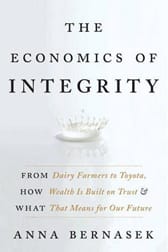Discredited, Discarded, and Demented: Donald Trump and His Tariffs
Instead of using the Supreme Court’s decision as an opportunity to liberate himself from his biggest policy blunder, Trump has doubled down on tariffs.
A review of The Economics of Integrity by Anna Bernasek (HarperCollins, 2010).

In book publishing, as in comedy, timing is of utmost importance.
John Kenneth Galbraith described his insecurities surrounding publication of The Affluent Society: “I feared it would be dismissed as another semi-socialist case for public spending…. Then in the autumn of 1957, the Soviets sent up the first Sputnik. No action was ever so admirably timed. … I knew the book was home.”
Unfortunately, The Economics of Integrity appears amidst reports of serious defects with the brakes, accelerator pedals, and electrical system on millions of Toyotas. Since Toyota figures prominently in this book, it is likely that it will be dismissed as another case for ethical behavior. This would be too bad, because this is a very good book.

Bernasek astutely notes that economists ignore cooperation and focus mainly on choices made by individuals to enhance their own welfare. In contrast, integrity is a collective good; everyone benefits from it.
Using numerous case studies, Bernasek demonstrates the gains from integrity. She shows how the Federal Reserve and the FDIC created faith in the U.S. banking system. Consequently, people have bank accounts rather than money in their mattress; this money finances spending and business expansion. She shows how eBay established a system so that people might bid on goods put up for sale by a total stranger in cyberspace. The key here was letting buyers rate the sellers. This gave potential buyers information about the integrity of sellers, and alerted them to new and unrated sellers.
L.L. Bean promised to accept returns at any time and for any reason. It trusted consumers to be honest; consumers, in turn, trusted Bean to honor its guarantee. And Toyota relentlessly pursued quality (at least until recently). As Bernasek notes, defects communicate dishonesty; a car without defects shows trustworthiness.
Wary people are reluctant to buy; firms that don’t display integrity invest less and sell less. Only when firms are responsible can people be confident that the goods they buy and consume will be safe. Then we get quality cars to drive, can borrow money at reasonable rates to pay for them, and are able to sell our used cars on eBay.
Bernasek ends with suggestions for fostering integrity. Transparency is crucial; hidden behavior creates temptations to be dishonest. People need simple behavioral norms, ones that are easy to follow and easy to detect when violated. Finally, we must hold people responsible for their actions.
Certainly, borrowers should be told in simple terms the costs and the risks of any loan they take out, and financial institutions need to put some of their money at risk when lending. But ethical and practical concerns can conflict. How to balance the two is the important question and something Bernasek does not address. When giant financial institutions are about to fail, should they pay a price for their irresponsible behavior? To hold firms responsible we should let them fail. But on a pragmatic level, should we risk economic collapse, with all the suffering that entails, just to punish Lehman Brothers?
The more important thing missing from this book, however, is an explanation of why integrity disappeared from the economy. Or, to be more contemporary, why did Toyota give up on quality and begin to peddle defective cars?
Here we need to return to Galbraith. The Affluent Society argued that after World War II, technology increased production possibilities, and Keynesian policies gave us full employment and an array of government policies helping average citizens, especially during difficult economic times.
Since the early 1980s, however, inequality has increased. Meanwhile, government has abandoned the poor and middle class, favoring large corporations and the wealthy.
In this brave new world of insecurity, firms and people struggle, and they behave badly in order to survive. Homeowners get pushed into complex mortgages they should never have taken out; insurance companies make it nearly impossible to get reimbursed for legitimate health care expenses. Employees who advance these policies are richly rewarded; those who don’t risk unemployment and poverty.
Yes, all this calls for another book. But it is one that I hope Anna Bernasek writes, and writes soon. Like Galbraith, she has the ability to make economic ideas come alive, explaining how and why they are important. And such a book is especially needed now, as our economy continues to suffer the consequences of a cut-throat, survival-of-the-fittest mentality.